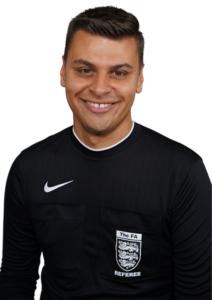Injuries can be so demoralising. Sometimes they just happen and come out of nowhere, and sometimes they are due to overuse or as a result of the wrong training regimes. I have had my share of injuries throughout my own refereeing career. I have gone through multiple painful and terrible ankle problems as well as knee and muscular issues.
I’ve also worked with clients who’ve ended up needing surgical procedures. Their sprained ankles were just unfortunate instances, but the knee surgeries were preventable.
One of my client’s first surgeries was when they sustained ligament damage early in their officiating career. As a referee who is constantly twisting and turning on each turnover in possession, this was devastating news for my client. They had started feeling pain in their knee months before and chose to ignore it and officiate through it. That pain did not go away, but in fact got worse. Much worse.
You would’ve thought that, that would have been a lesson they’d have learned from, wouldn’t you? You’d be wrong.
Sitting on the sidelines was a massive blow to my client. They felt disappointed in themself for getting injured. They described feelings of felt isolation, sadness, and simple disconnection during that time. My client started their rehab right away and was convinced that they were going to be the best to ever recover and win an imaginary award for their rehab and recovery. They excelled way too quickly in their rehab (and neglected to listen to their body when it told them to slow down). The client ended up coming back their ligament injury in 4 months and tore the ligament again in their very next game back. Any referee who has had back-to-back injuries that have resulted in surgeries knows this heartbreak. The client was utterly devastated again.
This time, I worked with client to convince them to do their rehab and recover in the correct manner.
I did not ever want my client to go through this incredibly hard time again and need yet another surgery. I am happy to report that this was their final knee surgery and they have the full range of motion and no pain, which is fantastic as they have been able to have a career with promotions since.
Injuries can be a major setback for officials. Whether it’s a sprained ankle or a torn ligament, injuries can cause a lot of physical pain and discomfort. What many people don’t realise is that injuries can also have such a massive impact on an referee’s mental health. I know that this was 100% the case with my client.
The guilt, disappointment, doubt, fear, anxiety, and stress is real. All of the anxious thoughts are real:
“Will I ever get back to this level of fitness again?”
“What do my colleagues think about me now?”
“I just want to be productive.”
“I feel like I let everyone down.”
“I’m not really going to have a purpose now.”
“I don’t want to slow down.”
“I feel so guilty I got hurt.”
“Am I going to get out of shape and fat now?”
As someone who has experienced these thoughts firsthand and as a coach, I want to shed some light on the emotional toll that injuries can take on referees.
Physical pain and discomfort are obvious consequences of injuries, but they can also lead to emotional distress. When we’re in pain, it can be difficult to focus on anything else. It’s hard to maintain a positive attitude when we’re constantly hurting. This can make it challenging to stay motivated and engaged in your recovery process. Not to mention supportive if you’re a part of a team.
In addition to physical pain, injuries can cause emotional pain as well. For officials, refereeing is often a huge part of our identity. When we’re unable to officiate, it can feel like we’ve lost a part of ourselves. This loss of identity can be incredibly difficult to deal with and can make us feel sad, frustrated, hopeless, lost, disconnected, and depressed.
Routine is also a crucial part of an referee’s life. When we’re injured, our routine is disrupted. We can no longer train and officiate like we used to, which can be incredibly disorienting. This can lead to feelings of uncertainty, anxiety and fear. Having thoughts of self-doubt in our ability to get back in shape and return to our level of performance is also a common theme when we struggle with injuries.
Physical changes to the body can also be a source of stress for injured referees. For example, surgery scars and losing muscle can be difficult to deal with. Female officials especially struggle with negative body image when dealing with injuries. Females may feel like their bodies are no longer capable of doing what they used to, which can be a blow to their self-esteem and increase anxiety.
Having worked with referees who’ve had multiple surgeries and injuries, I know how challenging it can be to deal with injuries. It can be a dark time, full of negative self-talk and doubt. You may feel like you’re letting people down – your colleagues, your coaches, your family, and even yourself. It’s easy to wonder if someone else will take your appointments, leaving you feeling not good enough.
Remember that you are not alone. Many officials go through this experience, and there is help available. One of the best things you can do is talk to someone about what you’re going through. Whether it’s a therapist, a coach, or a trusted friend or family member, having someone to talk to can be incredibly helpful.
Additionally, it’s important to stay engaged in your recovery process. This can help you maintain a sense of purpose and control, even when everything else feels uncertain. Physical therapy can be challenging, but it’s crucial for getting back to full strength. Try to focus on the progress you’re making, rather than the setbacks.
Finally, try to be kind to yourself. Injuries are a natural part of refereeing and they don’t define you as a person or an official. It’s okay to take some time to heal, both physically and emotionally. Remember that you’re not alone and that with time and patience, you can come out the other side stronger than ever before.
At The Third Team I work individually and in collaboration with different professionals where I have developed workshops and 1-2-1 sessions associated with Resilience and Mental Toughness Development to help referees. The workshops and 1-2-1 sessions are interactive, where referees are encouraged to open up and share their experiences to help themselves and each other.
Feel free to contact me if you’d like to know more about my workshops or 1-2-1 sessions and how I could help you or your officials.
Best Wishes,

Nathan Sherratt
Referee Educator & Managing Director of The Third Team

Nathan Sherratt
Nathan Sherratt, Referee Educator, Resilience Trainer and Managing Director of The Third Team. A Mental Toughness Practitioner based in Tyne & Wear, North East England.

